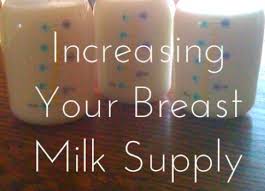How to increase breast milk supply
If you are a new mom, your one constant worry for the next couple of months is going to be your breast milk quantity. You will constantly worry about your baby getting enough milk especially if they are still on exclusive breastfeeding.
To know how to increase and maintain your breast milk, it is imperative that you understand the science behind breast milk production. The hormone Prolactin is the hormone responsible for milk production. Once it is signaled by your brain that milk is needed, the alveoli take from your bloodstream, proteins, fats and sugars to make breast milk. A network of the cells surrounding the alveoli then squeezes the gland to push out the milk into the duct. Therefore, when your breasts are full, the milk production is slower as compared to when your breasts are empty when the milk production is faster. Research has shown that the fat content of the milk is observed to be higher when your breasts are empty and less when your breasts are full.
How then would you know if your baby is getting enough of your breast milk?
Your baby should be feeding at least 6-8 times a day. However, I would discourage on having a feeding routine, just feed on-demand. With time you will be able to tell when your baby is hungry.
Your baby should be getting enough milk if they’re having at least 6 wet diapers a day. Exclusively breastfed babies might skip pooping for even up to 10 days, so not pooping should not be a concern. When babies are full, they will come off the breast, so let the baby breastfeed until they let go of themselves. To know if your baby is actually feeding, your breast will become flaccid after the feed and the nipple will be a little bit elongated.
Also, your baby should become lively and active after a feed. A steady weight gain every month is also an indicator that your baby is getting enough breast milk.
Low milk supply is mostly as a result of stress, hormonal changes, some birth control pills, dehydration and decreased breastfeeding.
If you are worried about low milk supply, you should talk to your lactation consultant or your doctor before trying out anything. They might prescribe a pill to stimulate breast milk production. You can also try out these home remedies to increase your breast milk like:
Galactagogues.
These are foods, herbs or prescriptions that help in increasing the breast milk production. Let’s look at Foods and Herbs.
Herbs such as Fenugreek, dill seeds, Fennel, Blessed Thistle, Stinging beetle, Anise, Ginger, Garlic and Brewer’s Yeast have been long known to increase stimulate milk production. You can put the herbs directly in your food, make tea from them or soak in Water overnight and drink the infused water. Some herbs are more effective when combined with Fenugreek works well with Dill or with Fennel seeds. You can find these herbs in organic stores such as Healthy U or shops that sell herbs. When making tea from the herbs, ensure that you use high-quality herbs and use the tea in moderation. If you do not know how to make, you can buy commercial nursing teas from the Supermarkets.
Foods such as Oatmeal, lactation cookies and foods made from wheat when taken, significantly increase your milk supply. Also, green papaya, nuts, carrots, sesame seeds and green leafy vegetables such as spinach help a lot.
Increase your fluid intake.
Water, whether warm or cold, is enough to just increase your breast milk. The secret is to keep your body hydrated. Other fluids such as millet and sorghum sour porridge, hot chocolate, Milo, Milk tea, Yogurt and Fruit Juices will also help to keep you hydrated.
More Breastfeeding.
Our bodies are wired to respond to the needs within itself, therefore, the more you breastfeed, the more the body will have the need to produce more milk. Therefore, breastfeed the baby as often as possible or as the baby demands.
Pumping.
Research has shown that your breasts are fuller in the early hours of the morning and then gradually reduces as the day progresses. If you want to pump milk, the early mornings would be a perfect time to pump. So if you cannot breastfeed as often, try breast pumping. This will also tell your body that there is need for more milk to be produced. If you will be away from more than 4 hours straight, consider pumping the milk so that more is produced. You can also pump after the baby feeds so that you completely empty your breasts. You can use a manual or electric pump. Some mums swear by hand expressing, you can try that too.
Take enough Rest.
Being a mum can be so tiring and especially if you have other young kids and a home to take care of. Consider getting help from your husband, family, and friends. You can also hire a nanny to help so that you can take care of yourself and rest.
Eat Healthily.
Your body will need nutrients to produce the milk so eat healthy, balanced meals as often as your bodies demands.
Avoid Top up feeds.
Breastfeed exclusively, as is recommended by the World Health Organization, do not introduce any milk, formula, water, juices or any solids. This will force the baby to breastfeed more.
Avoid Stress.
Keep off from Stress as much as possible. Talk it out if you feel overwhelmed with anything. Stress will cut your milk instantly. Find ways to unwind and manage stress. Create time for yourself and do things that you love doing and will make you rejuvenated.
You can never really tell what will work with breastfeeding, it is more a trial and error process. What will work for me might not work with you. Find what works for you and as with everything else, exercise caution. Breastfeeding is sensitive if you have to use anything to help with breast milk production, consult your doctor or a lactation consultant.

Do you have any news or article you would like us to publish? Kindly reach us via outreach@t4d.co.ke or howtodoafrica@gmail.com.




















